The Best Honey for Skin? Discover Manuka Honey for Skin Health & Renewal
In a hurry? Click here to read the Article Summary...
You’ve probably heard of the health benefits of honey, both for internal use (i.e., as a food/sweetener) and for external use. While using organic, local honey for skin can be healing on many levels, studies and experts alike say that nothing compares to a special kind of bee product called manuka honey. The list of benefits and uses of manuka honey for skin is legendary, ranging from moisturizing troubled skin to smoothing out wrinkles.
What Is Manuka Honey and Where Does it Come From?
Honey has been used for centuries as a tonic. And since at least the late 19th century, it has been used as a natural antibacterial, anti-inflammatory, and pain reliever [1].
Of course, all honey differs significantly in potency and nutritional content as well as in terms of flavor, texture, and consistency. Differences depend on a whole host of factors, including which vegetation bees pollinate, which type of bees do the pollinating, the geographical region and climate, and more.
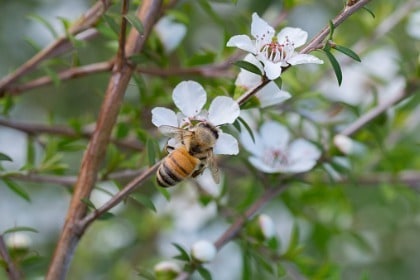
Manuka honey comes from New Zealand and Australia and is harvested from bees that pollinate the manuka bush. Some people call this bush “tea tree,” which can lead to some confusion.
Melaleuca vs Manuka
The “manuka tea tree” is different than the tea tree that is commonly known in the West for producing tea tree essential oil. There are some similarities between the two, however. Tea tree essential oil comes from the Melaleuca alternifolia plant and is native to Australia’s northeast coast. It is used in aromatherapy and as a powerful antifungal.
On the other hand, manuka’s Latin name is Leptospermum scoparium and this tree is native to New Zealand. It too is sometimes made into an oil or tincture.
Some experts say that in this form it is more powerful as an antifungal than even the melaleuca tea tree. Manuka essential oil has also been used by the Maori people for centuries for migraines, to balance mood, for insect bites, and to soothe aching muscles and joints [2].
The Science Behind Manuka Honey Benefits
Of course, manuka is best known for its use as a honey. In this capacity, it is a powerful substance for all the conditions listed above, and so much more.
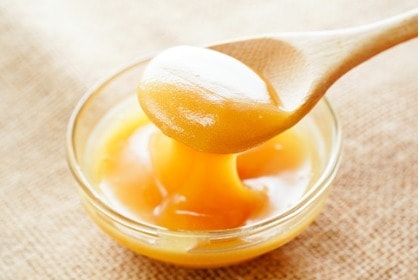
Besides containing all the beneficial phytonutrients, vitamins, and minerals that regular organic honey has, manuka also contains some components that set it apart from the others.
Most honey has antibacterial properties. Manuka, however, is said to be the most potent honey in this regard. There are a few reasons for this.
It is the presence of natural hydrogen peroxide which gives many varieties of honey their general natural antibacterial properties. Manuka contains specific enzymes that help to boost hydrogen peroxide levels as well as levels of two other phenols, methylglyoxal (a derivative of pyruvic acid) and the saccharide dihydroxyacetone.
Researchers at the University of Waikato in New Zealand have done a lot to help us understand the unique properties of manuka and its powerful effects for health [3]. Due in part to their investigations, there is now a specific way to measure the potency of each manuka batch.
The Higher the UMF, the More Potent the Honey
The “Unique Manuka Factor” or UMF, is based on levels of methylglyoxal, dihydroxyacetone, and hydrogen peroxide within a honey as well as other substances that are unique to manuka, such as Leptosperin [4].
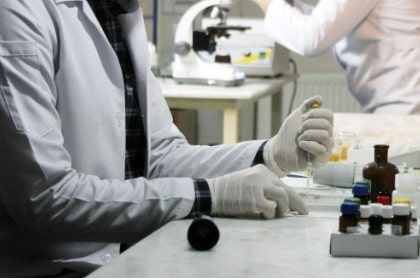
Not all manuka flowers will produce honey that contains these powerful healing substances in significant quantities. Those that do not will have a UMF level of 0 to 4 and can be sold as a consumable. UMF levels of 4 through 14 will have some general health and anti-bacterial benefits associated with them that will become stronger as the number goes up.
Manuka honey varieties with a level 15 and above are considered very therapeutic. Most experts suggest that a person taking manuka honey of 15+ take no more than one tablespoon at a time to reap the most benefits.
By the way, another way to “grade” manuka for its beneficial effects is a “KFactor.” This was created by New Zealand honey processor and manufacturer Wedderspoon. KFactors go up just as UMF numbers do. For example, a KFactor of 22 means that the variety is made up of 90% manuka pollen grains.
Why is there so much fuss regarding manuka purity? Manuka is known as the world’s most expensive honey and having strict guidelines ensures potency and purity and helps to alleviate knock-off or counterfeit brands. This is important because for years individuals have used manuka honey for specific conditions, as we shall see.
Manuka Honey for Gut Health and More
As mentioned above, manuka directly affects inflammation levels and bacterial overgrowth. Because of this, the list of manuka honey uses and the conditions and situations that may potentially benefit from it is long.

First of all, it can be very beneficial for the gut when taken internally. Some studies have indicated that manuka honey can help with the condition known as SIBO (small intestine bacterial overgrowth), acid reflux, and low stomach acid conditions.
This is because manuka honey can inhibit the growth of certain pathogenic bacteria in both the upper and lower gastrointestinal tract (GI). One 2013 study found that therapeutic grade manuka honey can help to inhibit Clostridium difficile, a pathogenic bacterium known to play a part in many digestive disorders [5].
Other Manuka Honey Health Benefits
Other internal health conditions manuka is reported to help with include:
- Staph infections (e.g., MRSA)
- Oral disorders such as gingivitis and tooth decay
- Immune suppressive and inflammatory conditions
- Allergies
- Sleep disorders (through promoting melatonin release) [6].
Research also indicates that therapeutic grade manuka can even be beneficial for patients with the genetic disorder cystic fibrosis. Manuka can help to lower levels of certain bacteria that can be problematic for these patients [7].
Manuka Honey Benefits for Skin
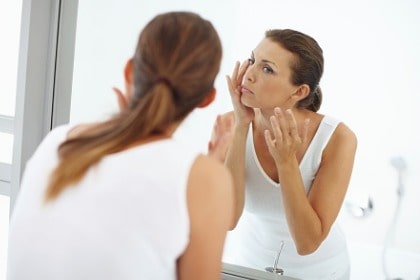
One of the most well-known benefits of manuka is skin health. Again, this is due in large part to the anti-bacterial characteristics of high-UMF honey.
According to a 2016 study published in the Central Asian Journal of Global Health [7], manuka can provide significant relief for individuals who suffer from:
- Eczema
- Acne
- Milia
- Dermatitis
- Ringworm
- Burns
- Lacerations and other wounds
Manuka Honey Skin Care
It makes sense, therefore, that this best honey for skin care can be found in skin creams, lotions, body butters, and even manuka honey face masks and eye masks.
It is also especially prevalent in high-quality face and eye creams and there is a good reason for this. Manuka honey can be extremely moisturizing because its chemical properties help to draw moisture to your face. In addition, it contains vitamins A, B, C, D, E, and K as well as heavy-duty antioxidants, beta-carotene, and enzymes.
Manuka works with the skin’s healing mechanisms to repair cells in all skin types. This can provide welcome relief from dry, chapped skin, can help to smooth out wrinkles, and even help prevent premature aging.
There you have it… all the basics you need to know to include manuka honey as a premiere go-to for overall health, including the health of your skin and face. Manuka is a proven ingredient to help your natural beauty shine through. Its sweet-smelling, purifying, and soothing properties can repair, calm, soothe, and beautify!
Did you know that manuka honey is just one of the high-quality, natural ingredients included in Organixx Skin: Renew Eye Cream.
Looking for an all-natural, toxin-free eye cream that can reduce wrinkles, nourish skin from the inside out, and help keep you looking young… longer? Introducing Renew Eye Cream – the most powerful and synergistic all-natural eye cream on the planet!
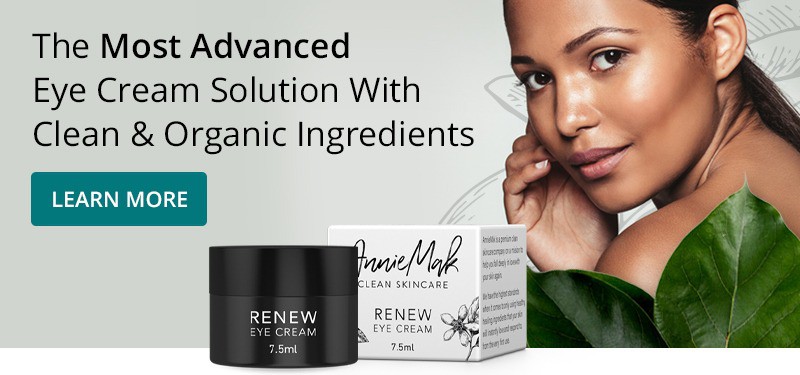
 Sources:
Sources:
Article Summary
While using organic, local honey for skin can be healing on many levels, studies and experts alike say that nothing compares to manuka honey.
Manuka honey comes from New Zealand and Australia and is harvested from bees that pollinate the manuka bush.
While most honey has antibacterial properties, manuka is said to be the most potent honey in this regard.
Manuka is known as the world’s most expensive honey and has strict guidelines to ensure potency and purity and help thwart knock-off or counterfeit brands.
Manuka honey is reported to help with a wide range of health conditions including SIBO, staph infections, allergies, sleep disorders, and even cystic fibrosis.
One of the most well-known benefits of manuka is skin health. It is a popular ingredient in high-quality skincare products, including Organixx Skin: Renew Eye Cream.


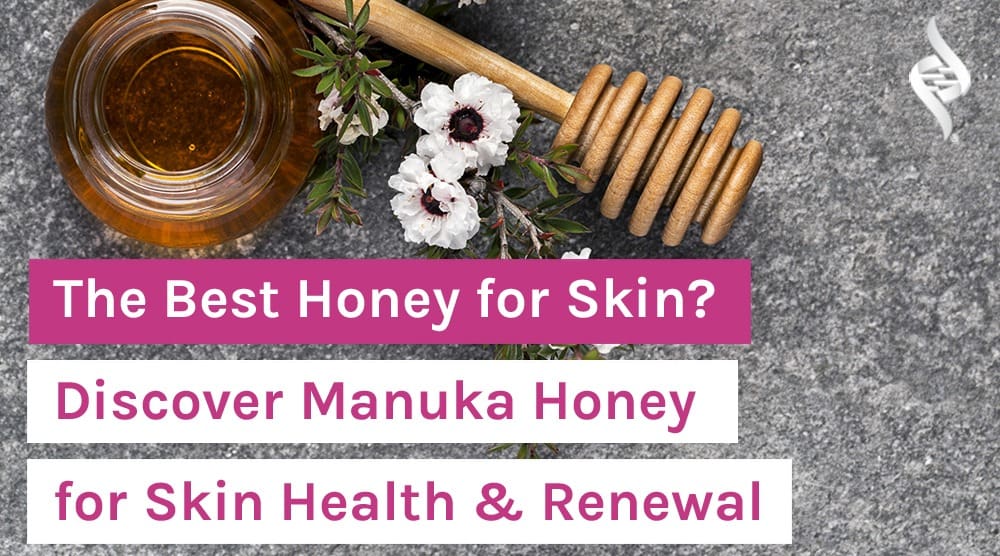
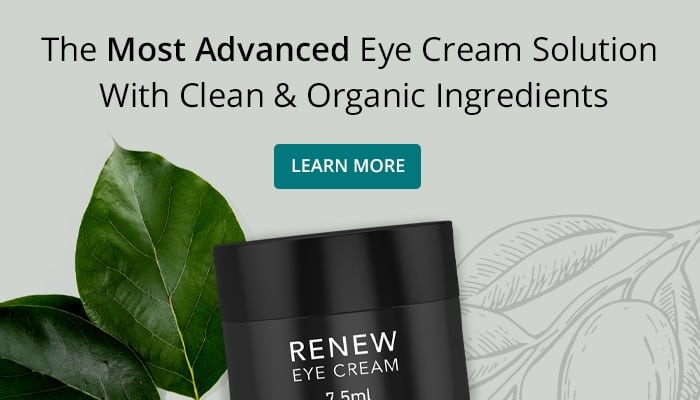

What is the UMF # in your product? Also is the eye cream and all ingredients molecularly structured to break down in the delicate eye area to be truly effective?
I’m a big Organixx fan who is also an Aesthetician & love all the information you provide! Thank you
I use an excellent Sheseido eye cream. Is there a manuka face cream?
Hi Suzanana, thank you for your question.
We hope you can check out the Organixx Skin: Renew Eye Cream that uses manuka honey as one of its high-quality and natural ingredients.
Thank you for your interest in Organixx. Wishing you a great day!